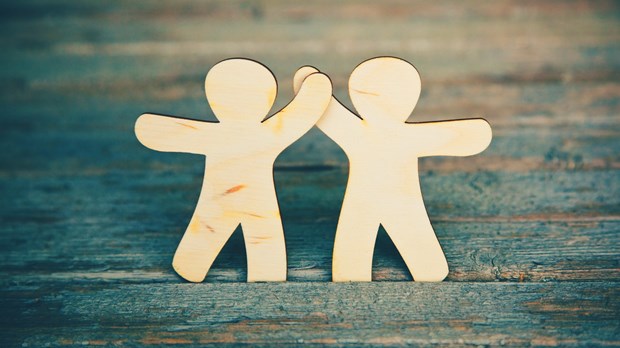Friendship: It Does a Body Good

WHEN ELISE NEEDELL BABCOCK was sent to bed for seven months to safeguard a fragile pregnancy, she kept her spirits up thanks to her husband, Jack, and a handful of friends. A buddy from work phoned frequently to pass along office jokes. A neighbor and full-time mom carried in picnic lunches and entertained her with stories and snapshots of her children. A bedridden pen pal from Chicago, whom Elise bumped into on the Internet, tapped out e-mail messages of support late at night when both women found sleep difficult.
"In times of crisis, we need a variety of friends," says Elise, a cancer counselor in Houston and the author of When Life Becomes Precious (Bantam, 1997). Her "confinement" had a happy ending. Daughter Lexi is now an active toddler, and Elise knows firsthand what her cancer patients have been telling her for years: Friendship can have a positive impact on health.
"Of my seven or eight closest friends, no two are the same," Elise says. "Yet each one had the ability to bring the outside world to me in a different way during those long months."
The idea that close relationships somehow help us prevent, cope with, and bounce back from illness has been around for years. But experts now have hard evidence that friendships actually boost our immune system, improve the quality of our life, and help us live longer. They point to a research project that exposed volunteers to a cold virus and proved that people with a variety of friends had an easier time fighting the germs than those without close relationships. A California study of terminally ill breast-cancer victims showed that those women who attended support-group meetings survived twice as long as those who didn't. In another experiment, heart patients with friends at their sides during checkups had lower blood pressures and slower heart rates than patients who came alone to the clinic. "Simply put, having someone to talk to is very powerful medicine," concluded a team of doctors after studying the friendship-and-health connection for five years.
Of course there's a flip side. If some friendships are good for our health, others can be harmful. The book of Proverbs cautions that "a cheerful heart is good medicine, but a crushed spirit dries up the bones" (17:22), and "he who walks with the wise grows wise, but a companion of fools suffers harm" (13:20). The "harm" that results from negative relationships often takes the form of stress that leads to anxiety that causes headaches that contribute to insomnia that … and the list goes on and on.
"When friends ask too much of us and we find it difficult to set limits, we may feel angry, resentful, or frustrated," explains Marilyn Myles, a social worker who teaches stress-management techniques to heart patients at Loyola University Medical Center in Chicago. "We bottle up those negative feelings, and that's not healthy. I've known recovering heart patients who actually go through a process of weeding out people who rob them of the time and energy they want to spend on more positive relationships."
Being selective of our friends and protective of our health doesn't mean we should limit ourselves to a tight little circle of confidantes who make no demands on us. To the contrary …
Build a Diverse Network
"The number of friends we have isn't as important as the diversity of the friendships," says Marilyn. A range of friends—from colleagues to allies, from buddies to prayer partners—can meet a range of needs. "We each have an inner core where our deepest feelings, needs, and beliefs are buried," she adds. "We share those with only certain people who make up our intimate circle." The next layer of friends may be more casual and include people we see regularly at church, work, school, or in the neighborhood. A third layer may include acquaintances who keep in touch only on birthdays or at Christmas. Although our inner circle will have the greatest impact on our physical, emotional, and spiritual health, the less intense relationships also can make a vital contribution to our well-being.
"I probably wouldn't continue jogging if I didn't have friends who run with me," says Elise. "We motivate each other to keep in shape." Just as casual friends can nudge us onto the track for some tension-relieving exercise, so can they munch carrot sticks with us as we diet or remind us to keep a doctor's appointment. "Friends help us take care of ourselves," Elise adds.
Diane Willis, a single working mom with limited time to socialize, helped launch "Buddy Check" in Indianapolis after she heard about the program's success on the West Coast. The idea is now spreading throughout Indiana. "It's a way of alerting friends to the need to do breast self-exams," explains Diane. On the same date of every month, each participant in the program telephones her assigned "buddy" to remind her to do a self-exam. In Diane's case, this means dialing Ardis Hendrix, a friend she sees only occasionally, issuing the reminder and then staying on the line to exchange news of their teenage sons. "We're at an age when everyone we know has been touched by cancer in some way," says Ardis. "Diane saw this project as a way to tackle an issue that affects so many of our friends." It also keeps a couple of busy pals in touch.
The importance of casual friendships doesn't diminish after we marry. Although our husband usually doubles as our best friend, he should never be our only friend. "Even the warmest, most compassionate marriage can't meet all our needs," says Mark Meadows, a social psychology professor at Union Institute in San Diego. "Some important interests may not be shared within the marriage, and friends can fulfill this void."
Welcome the "Unexpected" Friend
God often brings friends into our life at just the right moment to help us cope with an illness, grieve a loss, or make a tough decision that affects our health. "People can duck in for a short time and be what I call 'meaningful teachers,'" says Elise. "They can make a difference in ways we never forget."
Unfortunately, we often create barriers that make it difficult for God to work through our friends and other "meaningful teachers." We keep our lives so busy that we close the door to divine encounters and opt for isolation rather than communication.
Allie, a stay-at-home mom in Indiana, leaves her answering machine on even when she's working in the kitchen within easy reach of the phone. Why? "It screens my calls," she explains. A college professor sends e-mail messages to colleagues on campus rather than risk getting sidetracked by rambling face-to-face conversations.
Think about it. We may use communication gadgets not to connect us but to protect us from each other. Instead of signing up for a class at the library, we log onto the Internet and join a "chat group." We even blot out the sounds of people in public places by covering our ears with headphones and listening to tapes. All this innovation may make us efficient and keep us focused, but it also builds barriers and reduces opportunities for true friendship.
"Pity the man who falls and has no one to help him up!" warns Ecclesiastes 4:10. God often "helps us up" by placing just the right person at our side at precisely the right moment. Pity the woman who's so isolated she misses out on God's helpers.
Develop Two-way Friendships
Just as friends can be good for our health, so we can be a healthy influence on the people around us. One of the most important characteristics of a healthy relationship is our willingness to give as much joy and comfort as we receive.
Everyone understands the risk of having a friend who demands too much, but we overlook the downside of a friend who gives or expects too little. Elise Babcock recalls counseling a cancer patient who insisted that her friends not know about her serious medical condition. "I don't want to be a burden to them," said the woman. Elise gently pointed out that while her patient's motivation was good, her decision was bad for two reasons. First, her refusal to tell her friends about her condition deprived her husband of the support he needed from friends as he tried to understand and accept his wife's illness. Second, her refusal to share her burden deprived her friends of the joy of ministering to someone they loved.
Another important trait of a healthy friendship is the ability of both partners to listen. The Bible teaches us that when we offer counsel, our words should always be "full of grace, seasoned with salt." But before we can know which words to choose and what advice to offer, we must listen. To paraphrase James 1:19: Let every woman be quick to hear and slow to speak.
"Very few people have developed the skill of listening well," says Marilyn Myles. "Listening means setting aside whatever is going on in our own life, letting go of all distractions, and giving our full attention to another person. Nothing is as healing as having someone really listen to you."
Back to the Future?
Although it seems as though voice-mail messages have replaced conversation and pangs of guilt plague pals who dawdle over coffee, we may be on the verge of rediscovering the value of old-fashioned friendships that people throughout the ages have enjoyed. And that could be good for our health.
Look at the thousands of women coming together for encouragement and inspiration at conferences such as Joyful Journey/Women of Faith, Hearts at Home, Renewing the Heart, and others. It's there women are reconnecting with that sense of belonging: belonging to something bigger than themselves, to something that provides them with assurance that they're not alone in facing life's ups and downs. That—plus the sheer joy of group friendships—may be one of the healthiest trends of all to make a comeback!
HOLLY G. MILLER, a TCW contributing editor who teaches communication at Anderson (Indiana) University, is the author of Write On Target.
1998 by the author or Christianity Today/Today's Christian Woman magazine. For reprint information call 630-260-6200 or e-mail tcwedit@todayschristianwoman.net.
Read more articles that highlight writing by Christian women at ChristianityToday.com/Women
 Read These Next
Read These Next
 The Next Nineteen DaysI promised in sickness and in health, now I realize the true measure of a marriage
The Next Nineteen DaysI promised in sickness and in health, now I realize the true measure of a marriage
 The Hidden Power of SubmissionThe secret that can unlock deep intimacy in marriage
The Hidden Power of SubmissionThe secret that can unlock deep intimacy in marriage








 Homepage
Homepage